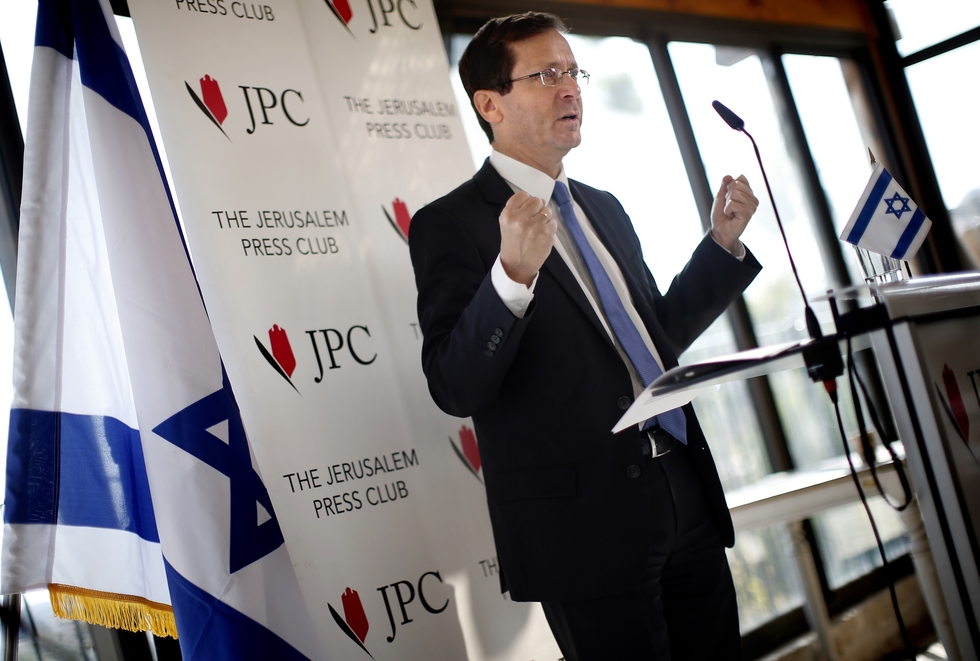Israel's Labor opts for apartheid

While attending the Labour party's congress early last week, which was summoned in order to ratify the "separation plan" of its leader Isaac Herzog, I had a little chat with one its activists. "The separation model didn't lead to peace before," I said, "why should it work now"? The Labour activist gave me a reprimanding look. "Did you hear the word peace?" he asked me. "Nobody is talking here about peace. Who wants peace?"
This activist had a point. In Isaac Herzog's speech before the Labor congress, the word "peace" was rarely mentioned. He claimed that he is still committed to the two-states vision, but "unfortunately… it's not possible to realise" it now. What could be realised is a unilateral separation from the Palestinians, in order to prevent the creation of "an Arab-Jewish state", in which, "god forbid, an Arab will be elected as mayor of Jerusalem".
Herzog's renunciation of the effort to reach the two-states solution was of course welcomed by Prime Minister Benyamin Netanyahu, who only this week promised to surround Israel with a fence in order to defend it from the "wild beast" around it. "Good morning, Buji (Herzog's nickname), welcome to the Middle East," Netanyahu told Herzog in parliament.
As the Labor party adopted a negotiated two-state solution as its main policy more than 20 years ago, following the Oslo agreement led by Prime Minister Yitzhak Rabin, a shift towards a unilateral separation without bothering to reach an agreement with the Palestinians may seem a dramatic one. Yet the truth is that the idea of imposed separation is well entrenched into the history of the Zionist Labor movement.
The early thinkers of Zionism called for the "occupation of Labor" by Jewish agricultural workers replacing the original Palestinians ones. Boycotting Arab products was also considered an effective political tool in order to encourage the creation of a separated Jewish economic system.
Hebrew Labor or Jewish Labor were key notions in the Zionist labour movement from the early 20th century onwards. The main Zionist trade union, the Histadrut, formed in 1920, accepted Arab members for the first time only in 1960. It is fair to say some practices adopted today by Israeli extreme-right and racist organisations, like monitoring employers who hire Arab workers, have their roots in notions formulated by Zionist Labor thinkers.
"We didn't arrive here in order to organise or spread socialist ideas to somebody [else]", wrote David Ben Gurion, the historic leader of the Zionist Labor movement and Israel's first prime minister, in his famous book From Class to Nation (1933). "We came here in order to build a working homeland for the Jewish people."
This tradition remained deep-rooted in the modern politics of the Israeli Labor movement. At least at the beginning, Rabin viewed the agreements with the Palestinians as a tool to separate them from Israel rather than a means for reconciliation with them.
Ehud Barak, the last Labor leader to be elected as prime minister in 1999, owed much of his success to the phrase he formulated: "us (Irsaelis) here, they (Palestinians) there". After the failure of the Camp David summit in 2000, he set out to convince the Israeli public that there was no partner in Yasser Arafat and the Palestinians in general.
He succeeded beyond expectations
After the beginning of the Second Intifada a few months later, it was a Labor minister, Haim Ramon, who started advocating the building of a barrier between the West Bank and Israel. Prime Minister Ariel Sharon's decision to build the now-defamed separation wall was hailed then in 2002 as a victory for the policies of the Labor party.
Yet throughout these years, this separation policy was depicted by the Labor party not as a goal in itself but as a tool to reach a higher target - a peace agreement with the Palestinians, based on the two-state solution. Emphasising separation, it was argued, would make it easier for the Jewish public to swallow an independent Palestinian state and an end to the Israeli occupation.
In this sense, Herzog's plan is breaking away from this past. It does put the two state-solution as an ultimate goal, but denies it could be achieved in the foreseeable future. The emphasis is put only on Israel's security needs. The Palestinians are no longer regarded as a political partner.
Herzog proposes to complete the separation wall around the settlement blocks, thus dividing the West Bank into enclaves which will hardly correspond with each other. He also proposes to put a wall around some of the Palestinian "villages" (a euphemism for proper neighbourhoods) around Jerusalem which were annexed in 1967, and give the Palestinian Authority civil control over these areas.
Such a move would mean to deprive hundreds of thousands of Palestinian Jerusalemites from access to the core of the Palestinian city and from the civil and social rights they acquired during 48 years of Israeli annexation.
Haim Ramon, who initiated his own separation plan under the slogan "saving Jewish Jerusalem", estimates that Israel would save up to three billion shekels ($750 million) in social benefits paid today to these Palestinian residents.
Yet according to Herzog, Ramon and other separation pundits who flourish now in the Israeli centre-left, the Israeli army would not withdraw to the separation lines forced upon the Palestinians. It would maintain its presence all over the West Bank. In short, Israel will keep its control over the West Bank. Only the Palestinians will be "separated". No wonder they were some who proposed to translate the "separation" plan into Afrikaners – apartheid
It's true that even before its last proposition, the Labor party (now part of the Zionist Camp) was rather weak and its ability to influence the government's policies or public opinion in general was limited. Yet the fact that it officially adopted Netanyahu's view on the irrelevance of the two-state solution means that it doesn't even put the prime minister's notions into discussion.
This impression is further strengthened when listening to the other big party on the centre-left: Yair Lapid of the Yesh Atid party speaks again and again about the need "to get rid of the Palestinians". With the exception of Meretz with its five seats out 120 in parliament, the Jewish centre-left does not pose any real challenge to government policy vis-à-vis the Palestinians.
Strangely enough, this leaves the Joint List headed by Ayman Odeh as the only true consistent opposition to the continuation of Israeli occupation. In the long run, this may rearrange the Israeli Left along less ethnic lines, involving Palestinian and Jews in common political struggle.
But this is still a distant dream in Israel. In the short run, Labor's separation plan is the best gift Netanyahu could hope for.
- Meron Rapoport is an Israeli journalist and writer, winner of the Napoli International Prize for Journalism for a inquiry about the stealing of olive trees from their Palestinian owners. He is ex-head of the News Department in Haaertz, and now an independent journalist.
The views expressed in this article belong to the author and do not necessarily reflect the editorial policy of Middle East Eye.
Photo: Israeli co-leader of the Zionist Union party and Labour Party's leader Yitzhak Hertzog speaks during a press conference at the Jerusalem Press Club, on 10 February, 2016 (AFP).
New MEE newsletter: Jerusalem Dispatch
Sign up to get the latest insights and analysis on Israel-Palestine, alongside Turkey Unpacked and other MEE newsletters
Middle East Eye delivers independent and unrivalled coverage and analysis of the Middle East, North Africa and beyond. To learn more about republishing this content and the associated fees, please fill out this form. More about MEE can be found here.





